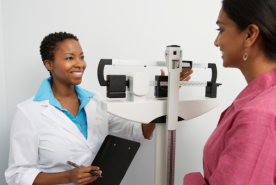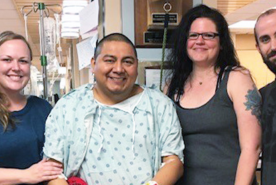Last Updated: December 16, 2024
Medically reviewed by NKF Patient Education Team
Table of Contents
- About Life After Donating a Kidney
- Recovering From Surgery
- Eating and Drinking After Donating
- Getting Pregnant after Donating
- Length of Life After Donating Your Kidney
- Keeping Up with Your Health
- Returning to Work, Sports, and Physical Activity
- Emotional Health After Donating
- Long-Term Risks of Living Donation
- Needing a Kidney Transplant After Donation
- Questions for your Health Care team
- More resources
About Life After Donating a Kidney
For most living donors, life after donating a kidney isn’t too different than before you donated. You can return to work a couple of weeks after you recover from surgery, return to physical activity, and eat a normal, well-balanced diet. Your risks of long-term problems like kidney failure are very low.
Recovering From Surgery
Usually, living donors stay in the hospital 1 to 2 nights after surgery. How long you’ll stay in the hospital depends on if you’re in pain, when your doctors feel that you’re ready to go home, and how close you live. Most donors who live close by can return home after 1-2 nights. If you live far away, the team will ask you to stay in the area for about one week, just in case you need to go back to the hospital for any reason.
The two most common types of surgery (laparoscopic and robotic) are non-invasive, meaning they allow the surgeon to remove your kidney safely while making the least number of incisions to allow your body to recover more quickly.
Right after surgery and a few weeks into recovery, you may feel:
- Bloated and constipated, which are normal symptoms after any surgery.
- Itching and some pain around the incisions (cuts) as they heal.
- Fatigue (feeling tired).
- Some discomfort from the gas that you’ll receive during surgery that allows the surgeons to see inside your body to remove the kidney.
- Shoulder pain after donating as any gas that is left over moves up the body.
Most living donors make a full recovery four to six weeks after surgery.
Eating and Drinking After Donating
There are no limits on what you can eat and drink after you donate. You should follow a healthy, well-balanced diet to take good care of your body and your one kidney.
You can drink alcohol after donating in moderation. Drinking too much alcohol is dangerous, and there is a greater risk for dehydration with one kidney. Make sure you drink enough water throughout the day to take care of your kidney and to stay hydrated.
Getting Pregnant after Donating
Pregnancy after donation is possible. It is usually recommended to wait at least six months to one year after donating. Your body will need time to adjust to living with one kidney.
Generally, living kidney donors do well with pregnancy after they donate. However, you may be at a slightly higher risk for gestational diabetes (diabetes during pregnancy), gestational hypertension (high blood pressure during pregnancy), and preeclampsia (health condition causing swelling, headaches and protein in your urine). If you’re a female donor, you should talk to your OBGYN doctor and transplant team before trying to get pregnant.
Length of Life After Donating Your Kidney
Donating your kidney doesn’t change your life expectancy (how long you’ll live). In fact, some studies have shown that living donors live longer than the average person. This is because donors are in very good health and get a full medical evaluation before being approved to donate.
Keeping Up with Your Health
It’s important to see your primary care provider (the doctor you see for yearly check-ups) each year to have your urine (pee), blood pressure, and kidney function (GFR) checked. While living donors are healthier than the average person and only have a slightly higher risk of developing kidney disease than someone who does not donate, it’s still important to go to your annual doctor visits to keep an eye on your overall health.
You won’t have to take any special medicines because you donated your kidney. You'll only need pain medicine and stool softeners for a few weeks after surgery.
Returning to Work, Sports, and Physical Activity
You should be able to return to normal activities four to six weeks after surgery. If you have a physical job, and need to return to work before six weeks, you can ask your employer if you can do paperwork or other work that involves little to no physical activity. You shouldn't lift anything heavier than a jug of milk for about six weeks after surgery.
You also may not be able to drive for up to two weeks, which is why your transplant team will talk to you about having a care partner (caregiver) or someone to rely on for a week or two after surgery.
It’s a good idea to avoid contact sports where your kidney could get hurt. Wearing protective gear such as padded vests under clothing can help protect your kidney during sports. Talk with your transplant team before returning to exercise or playing any type of sports.
Emotional Health After Donating
During your donation journey, you may experience a mix of both positive and negative emotions, including the excitement of waiting to see if you’re approved to donate. Then, once you donate and the emotional buildup ends, you may experience uncomfortable emotions, including feeling "down" and not like yourself for a short period of time. This is something that happens to a lot of living donors, but it’s important to remember that these feelings only last while you’re recovering and during the first few weeks after surgery. Living donors are also typically very healthy, active people so having the down time during recovery can sometimes add to these unpleasant feelings.
As long as you're aware of the possibility of feeling down, you can take some steps to help you feel better if you do experience them, including:
- Talking with another living donor before or after you donate. You can ask your transplant team to connect you with someone at their center, or contact NKF Peers, a mentoring program where you can talk to a living donor (by phone or video) about their experience and ask questions.
- Talk with a close friend or family member about how you're feeling for emotional support. Try scheduling a time every day or week so that you have something to look forward to while you recover.
- If you have and enjoy certain hobbies that involve little to no physical activity, try to continue them.
- Taking walks or other light physical activity can help you feel better (when your transplant team says it’s okay).
Most people who have donated a kidney report having a positive experience overall, with 90-95% of donors saying that they would make the decision to donate again, if they could.
Long-Term Risks of Living Donation
While donating a kidney is generally very safe, it’s important to know about the possible long-term health issues that you could be at risk for later in life, including high blood pressure.
Needing a Kidney Transplant After Donation
Your transplant team will talk to you about anything related to your health that may put you at a higher risk of developing kidney disease and be very thoughtful before approving you to donate. In rare cases, people who donate a kidney may have kidney failure and need a transplant later in life.
Less than 1% of people who donate develop End Stage Kidney Disease and need a kidney transplant. If you end up needing a kidney transplant after donating, you will be given a higher priority on the deceased donor waitlist.
If you donate through a National Kidney Registry (NKR) program, you’ll be given priority for a living donor kidney. As of 2024, NKR has had 6,000 people donate through their programs, and none of these donors have needed a kidney transplant.
Questions for your Health Care team
- How soon will I be able to go home after surgery based on where I live?
- Are there any sports that I should avoid after I donate? Can we talk about the activities I care about and how donating might affect them?
- Can you connect me with someone who has donated at your center?
More resources
- Talk to someone who has donated (NKF Peers)
- Ask questions and get help finding a transplant center (NKF CARES)













